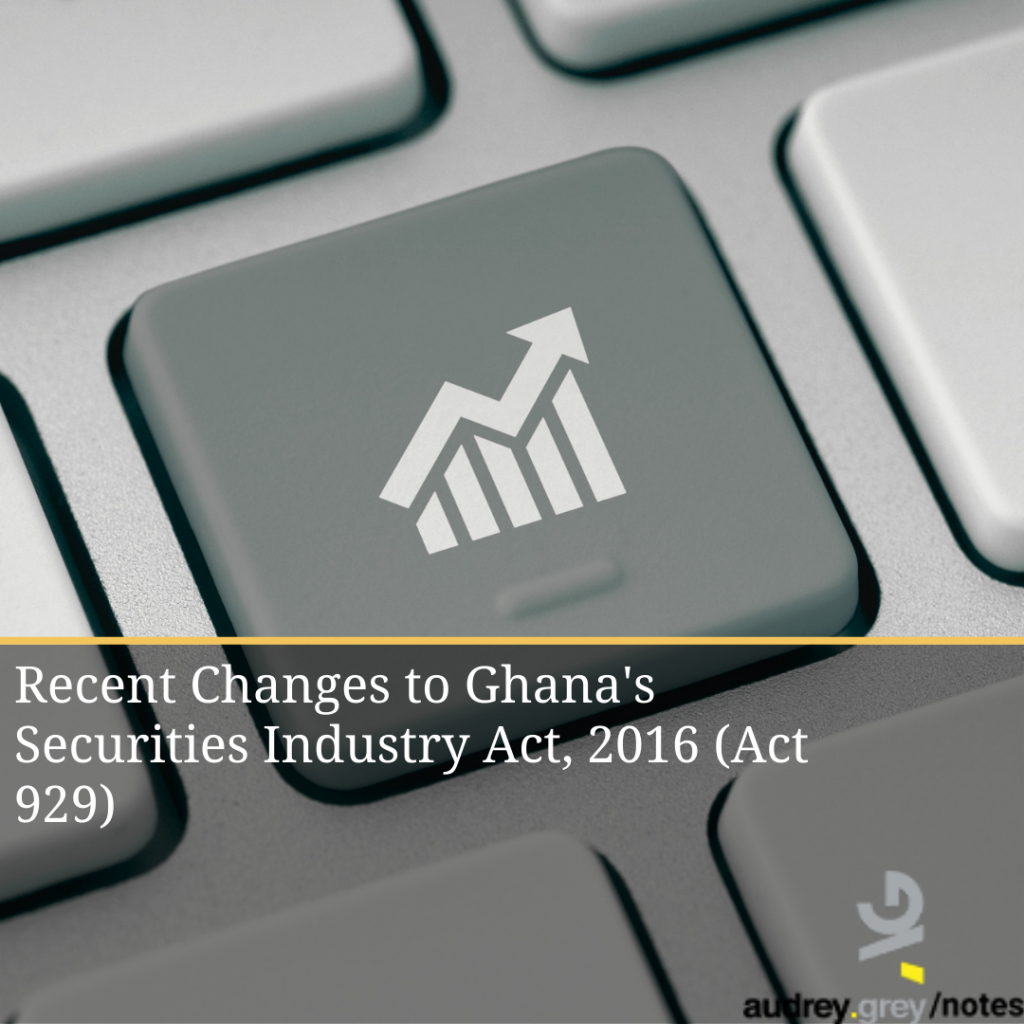In 2016, Ghana’s Parliament passed the Securities Industry Act, 2016 (Act 929). Act 929 repealed a 1993 legislation that did not take account of the sophistication in the securities industry and the challenges associated with them. Earlier this year, the Securities Industry (Amendment) Act, 2021 (Act 1062) came into force – amending some portions of the Securities Industry Act, 2016 (Act 929).
The Securities Industry (Amendment) Act, 2021 (Act 1062): (a) gives the Securities and Exchange Commission (“SEC”) the mandate to conduct investigations when assisting other domestic or foreign regulatory authorities; (b) sets out the procedure that the SEC must follow in dealing with requests for assistance from foreign securities regulatory authorities; and (c) gives SEC the power to enter into non-prosecution agreements persons who offend the Act.
These changes are briefly outlined below as follows:
SEC’s Inspection and Investigative Powers
Act 1062 makes an insignificant alteration to Section 35 of Act 929 (dealing with the investigation of certain matters) by taking account of the repeal of the Companies’ Act, 1963 (Act 179) and the introduction of the Companies’ Act, 2019 (Act 992). Aside from these minor changes, Section 35 preserves the mandate of the SEC to investigate a person who the SEC has reason to suspect has committed an offence under the Companies’ Act, 2019 (Act 992), or the Securities Industry Act, 2016 (Act 929). Further, the SEC has the mandate to investigate a person found guilty of fraud or dishonesty concerning the issuing and dealing in securities. A person assisting a domestic or foreign regulatory authority may come under the scrutiny of the SEC.
Power to Request Bank Account Records
Section 37 of Act 929 empowers the SEC to ask the Bank of Ghana to provide account details of persons under investigation. Further, the SEC may seek the assistance of the Bank of Ghana in understand the information provided by the Bank of Ghana. Under the same section, Act 929 goes on to prescribe the procedure to be followed in the event where the request for the bank account records comes from a foreign securities regulatory authority.
Act 1062 now separates the request for bank account records from the SEC from a request for account records from a foreign securities regulatory authority. In the case of a request for bank account records from a foreign regulatory authority, the SEC must first seek the approval of the court for the release of the account information. The request for the account details and any proceedings connected to it must be heard in camera. A person whose account details are required must be notified of the court proceedings even though that person does not have “a right to access the information contained within a request for assistance.”
Offences Under the Act and Agreements Not to Prosecute
Whiles the above changes may only be considered as “niceties”, the real reason for the amendment may have been Section 209(4) of Act 929 which deals with sanctions for breach of Act 929. These sanctions include the imposition of restrictions and conditions on licences or the revocation of licences. The SEC may also impose administrative sanctions and penalties in fitting cases. What is however new here is the power given to the SEC, and the Attorney-General to enter into some form of a non-prosecution agreement with a person whose conduct amounts to a criminal offence, and who has voluntarily agreed to make an offer of compensation and restitution. The Attorney General is required by Act 1062 to advise on whether the offer of compensation or restitution is satisfactory. An offer of compensation and restitution considered satisfactory must be paid within 14 days of demand.
Conclusion
From a review of Act 1062, it can be said that the main reason for the amendment of Act 929 was to make it possible for the SEC to enter into deals with persons who have committed offences under the Act, and who have agreed voluntarily to make some restitutions, and offer some form of compensation.

